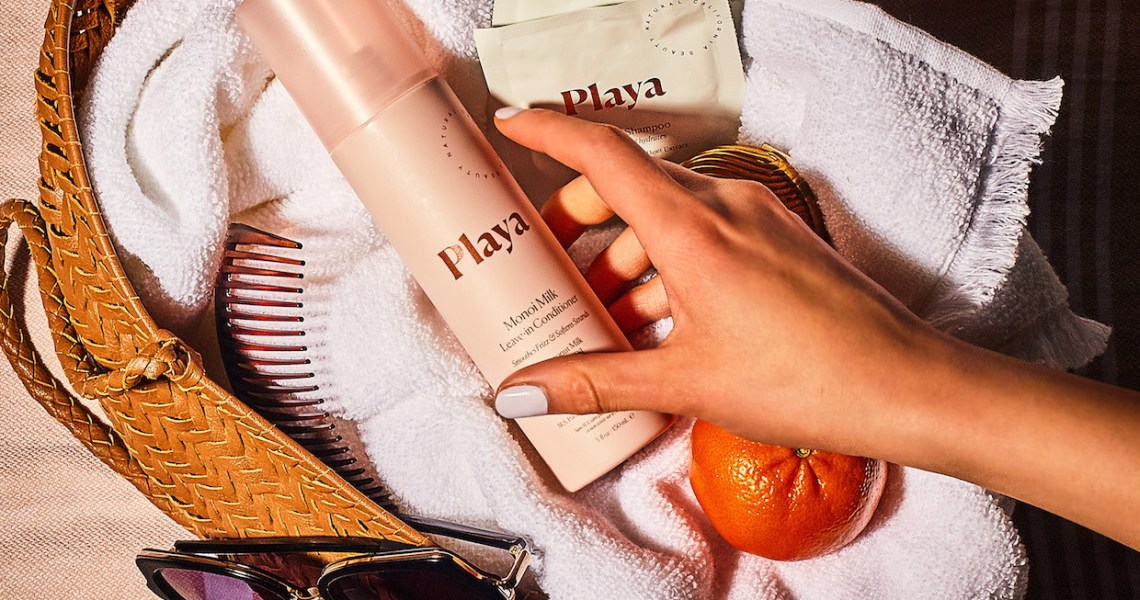Clean hair care brand Playa is expanding its distribution strategy to wholesale professional salons.
The 4-year-old brand first launched with five products based on a California sun-kissed lifestyle. Over time, its portfolio has steadily expanded to 10 products; it was acquired by Forma Brands in Aug. 2020. It predominantly sells through Sephora as part of its Clean at Sephora initiative.
Newly formalizing its professional channel, it will begin selling through 100 salons starting in the second quarter, including Ramirez Tran in Los Angeles. Playa expects the professional wholesale channel to make up 10% of the brand’s annual revenue in the first 12 months, said Shelby Wild, Playa founder and CEO. Currently, DTC and wholesale sales are evenly split, she said.
In addition, the brand is rebooting its affiliate program to allow salon partners to earn a 20% affiliate commission. The brand is providing them a unique link to receive a commission when customers purchase outside the salon. According to previous Glossy reporting, Playa anticipated earnings between $4 million and $5 million in 2019. The brand declined to comment on 2020 sales and growth.
“We want to make sure there are hyper-personalized touchpoints, so we’re not just plugging into a [wholesale distributor] to scale from a revenue perspective,” said Wild “We want to make sure there is an education-focused initiative, that we’re partnering with stylists that represent the brand lifestyle and that we have a firm grasp on some of the messaging.”
Playa will host virtual training once a month with Wild and educational field team members. They will talk through each product, including how to use it, and answer questions. As social distancing restrictions begin to ease, Playa will transition to in-person training sessions regionally. Salons receive a 50% off discount on products purchased in multiples of 12, as well as flat-rate shipping, marketing materials with product and brand literature to distribute among the staff, and ad sample products. Salons can sign up through the wholesale link on PlayaBeauty.com, but Playa has also maintained a list of salons that have reached out over the years and has contacted them directly for its pilot program.
The affiliate program will be prominently promoted on the homepage of PlayaBeauty.com on a monthly basis. Affiliate stylists may also be featured on the brand’s Instagram, along with their tips and tricks. Wild said that stylists are an effective tool for word-of-mouth marketing and that, rather than put more money behind paid ads, it made more sense to promote the brand directly to stylists.
Ad position: web_incontent_pos1
Alyssa Behrendt, Kline senior research analyst of consumer products, said Playa’s entrance into the professional wholesale channel goes against the grain of the market’s movements. Professional brands like Olaplex, Amika, R+Co and Kerastase have leaned more on DTC e-commerce or Sephora partnerships during the pandemic. According to Kline Pro data, salon retail product sales bottomed out in April 2020 during the height of lockdown, falling 87% year-over-year. The year ended up with salon retail product revenue falling about 24% compared to 2019.
However, given that clean hair care has become a more popular category with brands like Briogeo and Odele nabbing headlines, the entrance into the professional channel is an opportunity for the category’s growth. Briogeo notably participated in Ulta Beauty’s back-bar service, where stylists are able to use and demonstrate the products. While longstanding professional brands have not exited the salon, having their backs turned provided newer brands with an opportunity to encroach into the salon space.
“Consumers are demanding new fresh products that are exciting. But it also depends on the stylist. We’ve seen consumers become less brand loyal, and more willing to try new things and experiment,” said Behrendt.




